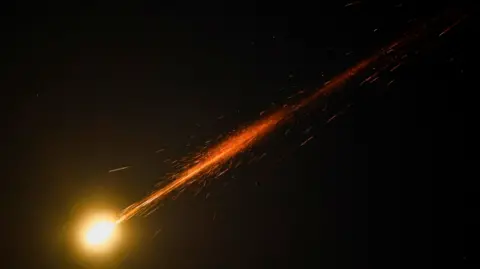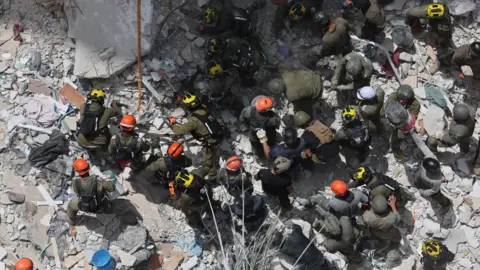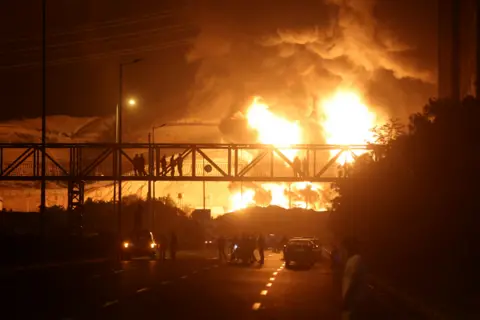Iran launches new strikes on Israel as Israeli attack widens
 Reuters
ReutersIsrael and Iran launched strikes against each other for a third day on Sunday, with both countries vowing to continue responding to attacks.
On Sunday evening, there were explosions in the sky above Tel Aviv and Jerusalem as Israel's defence system shot down missiles fired from Iran.
In overnight strikes on Saturday, ten people, including two children, were killed and more than 100 injured in Israel, authorities said.
Israel said its strikes had hit dozens of targets in Tehran. Iranian media, quoting the health ministry, said 224 Iranians had been killed and 1,277 injured as of Sunday evening.
Israel initially launched an attack on Iranian nuclear infrastructure and other targets on Friday.
Iran later confirmed the head of the Islamic Revolution Guards Corps (IRGC) intelligence unit, Mohammad Kazemi, had been killed, alongside a deputy and another commander.
BBC journalists are unable to report from inside Iran due to restrictions by the country's government, making it difficult to assess the damage caused by Israel's offensive.
In Israel, sirens blared on Sunday evening, causing people to take shelter as incoming missiles were intercepted.
Iran's state TV said the country attacked Tel Aviv, Haifa and other cities with "tens of Iranian missiles and drones".
Israeli police confirmed a weapon hit "one of the settlements" in the northern coastal port city of Haifa, where footage showed thick columns of smoke rising into the night sky.
"At this stage, no reports of casualties have been received, but property damage has occurred," officials said.
The evening attack came after overnight strikes into Sunday morning, which hit homes in northern and central Israel.
A 10-storey block of flats in Bat Yam was struck in the early hours, killing six people, including a 10-year-old-boy and a eight-year-old girl. Others were trapped underneath rubble.
Four people were also killed in Iranian attacks on the northern Arab town of Tamra, according to emergency services and the local hospital.
Rescue paramedic Ori Lazarovich, who was working at the scene in Bat Yam, told BBC News: "We started triaging people, while the building was still on fire on one side.
"Some were crying and some were holding their family members, I saw fear in their eyes."
"People came out all grey, covered in soot and ash and debris and suffering from smoke inhalation," he added.
A woman who lived in a building next to the blast zone in Bat Yam sat surrounded by suitcases.
"We've been here 24 years and now we have to start over. I'm holding myself back from crying," she told the BBC.
Visiting the scene of the attack, Israeli Prime Minister Benjamin Netanyahu said Iran would pay a "very heavy price" for "the premeditated murder of civilians, women and children".
Meanwhile in Iran, Tehran's oil ministry said the Shahran oil depot in the capital was hit by Israeli strikes overnight.
Israel's military said fighter jets struck more than 80 targets in Tehran overnight, including the Iranian Ministry of Defense and "additional targets where the Iranian regime hid the nuclear archive".
An aerial refuelling aircraft was also struck at an airport in the north-east city Mashhad.
The Israel Defense Forces (IDF) issued a warning on social media to the Iranian people, telling them to stay away from all weapons manufacturing facilities.
Writing in Farsi, IDF spokesman Avichay Adraee said: "For your own safety, we ask you to evacuate these facilities immediately and not to return until further notice."
One resident in Tehran told BBC Persian: "Everyone is trying to escape Tehran - one way or another".
Another said: "Tehran isn't safe, clearly. We get no alarms or warnings from officials about Israeli attacks. We just hear the blasts and hope our place isn't hit.
"But where can we go? Nowhere feels safe."
Netanyahu told Fox News on Sunday that he thinks Israel has set Iran "back quite a bit" in its nuclear capacity.
"I think they were completely surprised," he said.
Between Saturday and Sunday, the officially reported death toll in the country increased by almost 100 - from 128 up to 224.
However, other estimates put the number of fatalities in the country much higher.
Human Rights Activists News Agency (HRANA), a Washington-based human rights organisation that has long tracked Iran, said the total number of civilian or military deaths in the country over the past two days - as of 22:00 GMT on Saturday - reached at least 863.
 EPA
EPABoth countries have promised further retaliation
"If [Supreme Leader Ayatollah Ali] Khamenei continues to fire missiles at the Israeli home front, Tehran will burn," Israeli Defence Minister Israel Katz said.
Iranian Foreign Minister Abbas Araqchi said his country had the right to defend itself from aggression - and that Israel must stop its attacks.
Three US officials told CBS News, the BBC's US partner, that US President Donald Trump rejected a recent Israeli plan to kill Iran's Supreme Leader Ayatollah Ali Khamenei.
During an interview with Fox News on Sunday, Netanyahu did not directly confirm or deny the story, first reported by Reuters.
The Iranian former crown prince Reza Pahlavi - the son of Iran's former Shah who was overthrown in the country's 1979 Islamic revolution - has told the BBC people who oppose the country's government have been "re-energised" by Israel's attacks, which killed senior Iranian military leaders.
"The ultimate solution is regime change, and now we have an opportunity because this regime is at its weakest point," he said, speaking from exile on the Sunday with Laura Kuenssberg show.
On Sunday, Trump told ABC News that "it's possible [the US] could get involved" after reaffirming the country is not involved in the conflict "at this moment".
He added he is "open" to Russia's Vladimir Putin becoming a mediator between the two sides.
 Reuters
ReutersAdditional reporting by Gabriela Pomeroy
